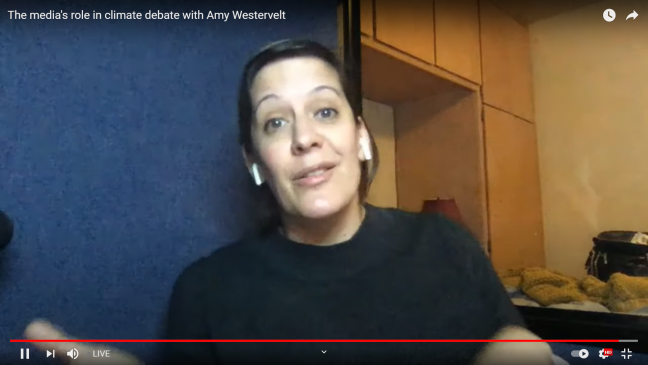Historically and today, media institutions and public relations firms have remained complicit in climate-related misinformation campaigns by fossil fuel companies, one climate journalist said Wednesday.
Spring journalist in residence Amy Westervelt of the Critical Frequency podcast discussed the role of media in communicating, and often obscuring, climate change science Wednesday night at a La Follette seminar.
Historically, many people looked upon big oil companies as caregivers, as the fossil fuel industry provided funds for infrastructure, wealth and development for smaller communities, Westervelt said. But nobody really understood the environmental impacts of this industry yet. In fact, the first controversies journalists exposed the oil industry for were their abusive labor practices.
Journalists stepped in to report on worker strikes, and to preserve their reputation, oil companies had to start public relations campaigns. The techniques these campaigns used would later come in to push back against environmental activists.
Online organizers promote Mifflin Block Party despite MPD, UW warnings
“There are these things that we think are organic ideas that just come about or that the narrative around certain issues has just naturally evolved over time, and yet there are often [PR] people working behind the scenes that are paid a bit and are quite good at their job,” Westervelt said.
Back in the day, investigative reporters like Ida Tarbell, who exposed Standard Oil and Rachel Carson, who wrote about pesticides’ impacts on the environment, had the resources to expose these massive industries, but today, Westervelt said, journalists don’t always have the resources to keep these companies in check.
“We don’t have so many Ida Tarbells anymore, or Upton Sinclairs, or these antagonistic investigative journalists,” Westervelt said. “You take these [PR] techniques and give them the benefit of 100 years of refinement and then put them in a context where journalists are asked to produce way more content in way less time for way less money where access journalism is rewarded … and suddenly we have a very big information problem.”
Plus, leaders in Big Oil PR like Edward Bernays and Ivy Lee used psychological tools to bust unions and mount campaigns rooted in patriotism against journalists seeking the truth.
Often, these campaigns would position anyone against Big Oil as socialist or anti-American.
Science politicization, funding fights leave researchers in limbo
“The American way or idea is how the oil industry positioned itself,” Westervelt said. “Out of WWII, you get a new breed of PR guy who gets trained on psychological war and propaganda, and fighting Nazis, who comes home and puts this to work for companies.”
As environmental movements picked up speed in the 70s, fossil fuel companies switched their PR tactics to push environmental responsibility onto the consumer, Westervelt said. By telling consumers to pick up trash, they wouldn’t have to take responsibility for pollution themselves.
Sponsored content — or content that runs in a newspaper as if it’s a regular article but is actually paid for by a business — emerged around that time as well, which fossil fuel companies used to position their content as if it was a reported story, Westervelt said.
And, fossil fuel executives would harangue journalists into allowing them to share “their side of the story,” positioning corporations as people with feelings, Westervelt said, which created this idea of false equivalence, or “both-sides-ism.”
“Journalists felt like ‘well, if I’m doing a story on climate change, I have to talk to one climate scientist and one oil executive who doesn’t think climate change is happening,'” Westervelt said.
Westervelt said while often, these companies tied journalists’ hands in these situations, the media industry still has a lot of blame to take for being complicit and continuing to perpetuate these damaging PR strategies.
Even today, Westervelt said we can see things like carbon footprint calculators that shift the climate crisis to the fault of the consumer. But, a new generation of youth climate activists and investigative journalists once again diving into fossil fuel companies could begin to reform the way we think about climate.
And now, holding these institutions accountable is more important than ever, Westervelt said.
“You have to look at the PR industry and the media industry for being so susceptible to it, along with the oil industry,” Westervelt said. “The idea of taking this systemic problem and shifting the blame away from companies who benefit from this problem and over to the consumer.”
























